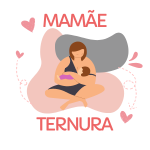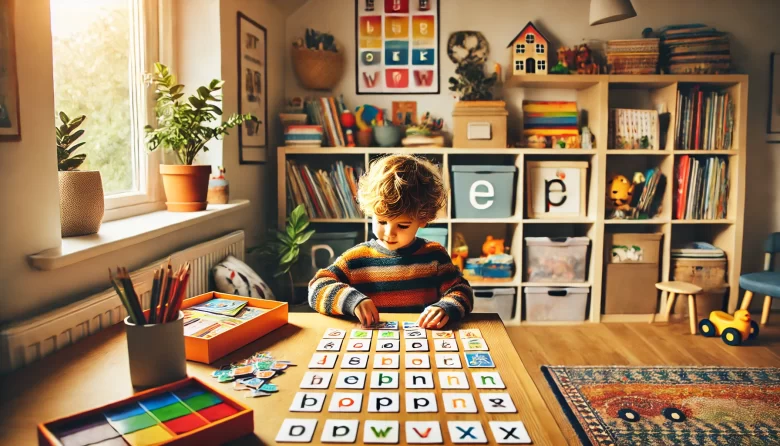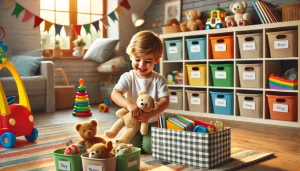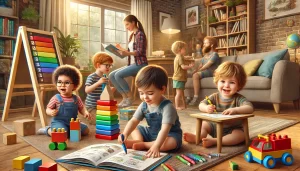Early literacy development is crucial for building strong reading and writing skills. While traditional teaching methods are effective, incorporating games into learning makes the process more engaging and enjoyable for young children. Play-based learning helps children recognize letters, develop phonemic awareness, and build confidence in their language abilities.
In this article, we’ll explore the importance of early literacy, fun games to support reading and writing skills, and practical tips to make learning playful and interactive.
Why Games Are Effective for Early Literacy
Children learn best through hands-on experiences and play. Games provide a fun, low-pressure way for kids to practice literacy skills while staying engaged.
Key Benefits of Learning Through Games:
✅ Boosts letter and word recognition in a playful way.
✅ Encourages a love for reading by making it fun.
✅ Improves listening and speaking skills through interactive play.
✅ Strengthens memory and problem-solving abilities.
✅ Reduces learning pressure, making reading and writing feel like an adventure.
🎯 Pro Tip: Games should feel like play, not work—avoid turning them into strict lessons.
Fun and Effective Literacy Games for Young Learners
Letter Scavenger Hunt
This game helps children recognize letters and connect them with real-world objects.
📝 How to Play:
- Write letters on index cards and hide them around the house.
- Give your child clues: “Find the letter that starts with ‘A’ like ‘apple’!”
- When they find a letter, ask them to say its name and sound.
🎯 Pro Tip: For an extra challenge, ask your child to find objects that start with the letter they found.
Alphabet Hopscotch
This active game combines movement and literacy learning.
🏃 How to Play:
- Use chalk to draw letters on the ground (or tape letters to the floor inside).
- Call out a letter, and your child has to jump to it.
- Level up by asking them to say a word that starts with that letter.
🎯 Pro Tip: Adding physical activity helps improve focus and memory retention.
Story Dice Game
Encourages storytelling and vocabulary expansion in a fun way.
🎲 How to Play:
- Draw simple pictures or words on small paper squares and place them in a cup.
- Shake the cup and let your child pick 3-4 pictures.
- Have them create a short story using the words they picked.
🎯 Pro Tip: Use small toys or objects instead of paper for a hands-on storytelling experience.
Fishing for Letters
A hands-on way to practice letter recognition.
🎣 How to Play:
- Cut out fish shapes and write letters on them.
- Attach paper clips to the fish and use a toy fishing rod (or a stick with a magnet).
- When your child “catches” a fish, they say the letter and a word that starts with it.
🎯 Pro Tip: This game works great for both uppercase and lowercase letter matching!
Rhyme Time Challenge
Builds phonemic awareness by helping children recognize rhyming words.
🎤 How to Play:
- Say a simple word (e.g., “cat”).
- Ask your child to come up with a word that rhymes (e.g., “hat”).
- Keep going until you run out of rhymes!
🎯 Pro Tip: Use picture cards if your child is still learning to recognize rhyming patterns.
Word Building with Playdough
A tactile way to learn letter formation and spelling.
🖐️ How to Play:
- Write a simple word on a card.
- Have your child roll playdough into “snakes” and shape the letters.
- Say each letter sound as they form it.
🎯 Pro Tip: Try this with cookie dough and bake the letters for a fun snack!
“I Spy” with Letters
A classic game that enhances vocabulary and letter recognition.
👀 How to Play:
- Say, “I spy something that starts with B…”
- Let your child look around and guess what it is (e.g., “Book!”).
- Take turns being the “spy.”
🎯 Pro Tip: Use letter sounds instead of letter names to strengthen phonemic awareness.
Puppet Show Storytelling
Encourages children to create and narrate stories.
🎭 How to Play:
- Use hand puppets or stuffed animals.
- Have your child make up a short story and act it out.
- Ask open-ended questions to help expand their ideas.
🎯 Pro Tip: Record their performance so they can watch and celebrate their storytelling skills!
Mystery Bag Word Game
Helps children connect spoken words to objects.
🎒 How to Play:
- Place small objects (toy car, apple, spoon) in a bag.
- Have your child pull out an object and name it.
- Challenge them to say a word that rhymes or begins with the same letter.
🎯 Pro Tip: Let children describe the object before naming it to build vocabulary skills.
Letter Matching Puzzle
Great for early learners practicing letter shapes and sounds.
🧩 How to Play:
- Write uppercase letters on one set of cards and lowercase on another.
- Mix them up and ask your child to match them correctly.
- Say the letter sounds together.
🎯 Pro Tip: Use a timer to turn it into a fast-paced matching challenge!
Making Literacy Learning a Daily Habit
Read Aloud Every Day
📖 Choose engaging books with rhymes, repetition, and colorful pictures.
🎯 Pro Tip: Let your child “read” by describing the pictures.
Label Everyday Objects
🏠 Place sticky notes on items like “door,” “table,” and “window.”
🎯 Pro Tip: Change labels weekly to introduce new words.
Encourage Writing and Drawing
📝 Give your child a notebook for doodling and “writing” letters or stories.
🎯 Pro Tip: Celebrate their work by displaying it on the fridge!
Common Challenges and How to Overcome Them
“My child isn’t interested in letters.”
✔️ Solution: Use their interests (e.g., dinosaurs, cars) to introduce literacy games.
“They get frustrated with reading.”
✔️ Solution: Keep activities short and fun—never force reading practice.
“My child prefers screen time.”
✔️ Solution: Balance screen use with interactive games and hands-on activities.
🎯 Pro Tip: Turn digital time into learning time with educational apps like Starfall or ABCmouse.
Final Thoughts
Learning to read and write should be an exciting adventure, not a chore. By incorporating fun literacy games into everyday life, children develop a love for words, storytelling, and communication.
Games create a stress-free environment where kids can explore language naturally—setting the foundation for a lifelong love of reading and learning!




